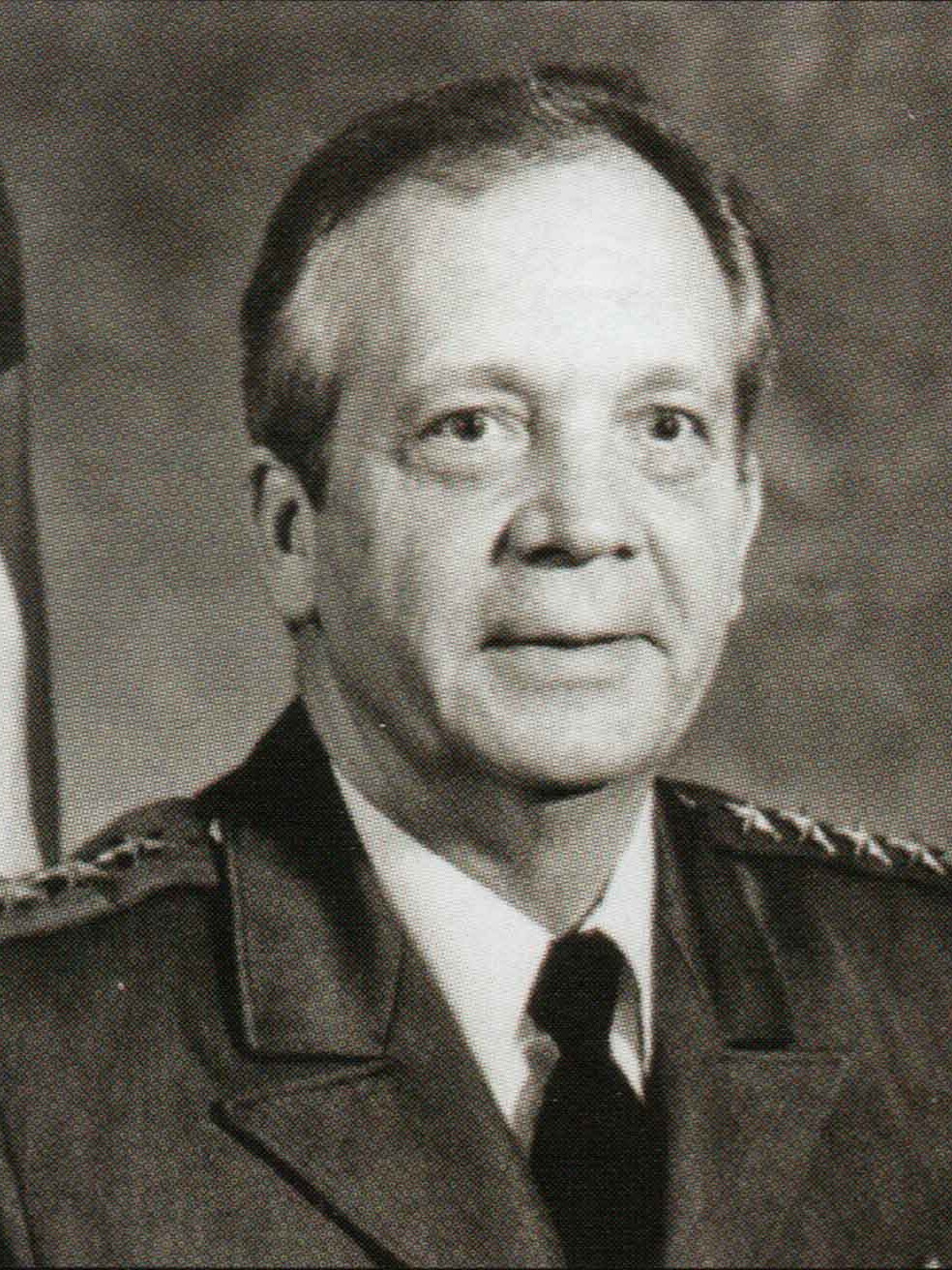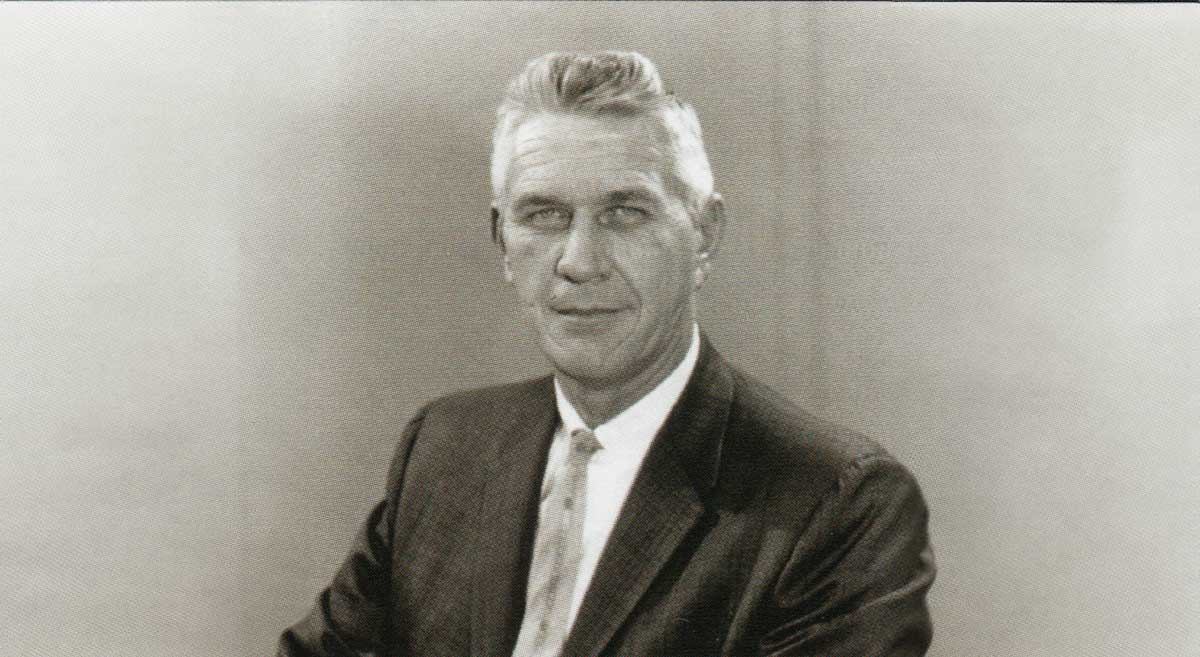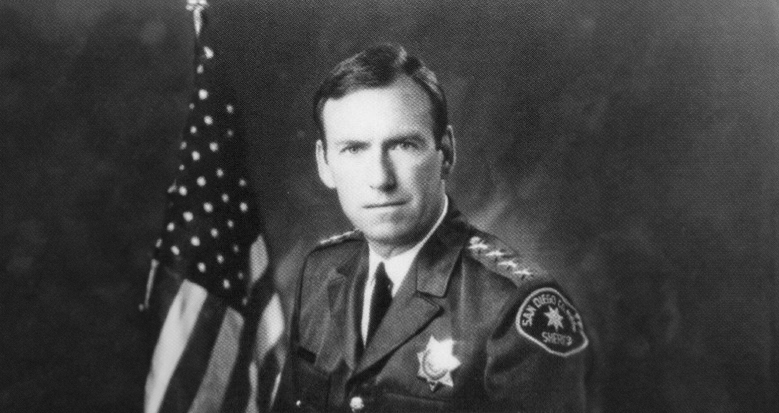Born in Galveston, Texas on June 10, 1930, John Duffy came to San Diego when he was 16 and later graduated from Grossmont High School in 1948. He served as a sergeant in the Marine Corps during the Korean War. On May 25, 1953, John Duffy became a deputy sheriff after posting the highest score on the entrance exam. He quickly ascended through the ranks to captain. In 1970 he was elected as the 26th Sheriff of San Diego County and took office on January 4,1971. He was reelected four times and retired on January 4, 1991.
During his 20-year tenure as Sheriff, John Duffy modernized the department and gained national and international recognition as a law enforcement leader. Under Duffy, the department grew from 500 to over 2200 members. The department became the first Sheriffs Department in California to become accredited under the leadership of John Duffy.
Sheriff Duffy organized a citizen support group known as the Honorary Deputy Sheriffs’ Association (HDSA) which donated over $1 million towards law enforcement safety, education and training. Their most significant accomplishment was the city block, state-of-the-art training facility at Camp Elliott known as “Duffy’s Town.”
Nationally, Sheriff Duffy served as the Chairman of the Commission on Accreditation for Law Enforcement Agencies and President of the Police Executive Research Forum based in Washington, D.C. He was a board member of the National Sheriffs’ Association, chaired their Law and Legislative Committee and was a faculty member of the National Sheriff’s Institute in Quantico, Virginia where he provided instruction to over 2,000 first time sheriffs throughout the nation. He was a member of the Advisory Board for the National Institute of Justice and served President Reagan as a member of the Justice-Treasury Advisory Committee on State and Local Law Enforcement Training.
His youngest son, James (“Jim”) Duffy spent 31 years with the Sheriff’s Department, running for Sheriff himself before retiring as a Sheriff’s Lieutenant.
John Duffy, who used green pens and had all the department’s patrol cars painted green and white because green was his favorite color, has been called everything from bully to genius.
During his many years as sheriff, he was a great motivator and inspired loyalty in his troops because he always supported them, some retired sheriff’s officials said. At the same time, some considered him an acerbic, tough-talking and self-important micromanager.
“He wasn’t a wuss about anything. He wasn’t authoritarian, but he certainly had a vision as to where he was going to go, and hopefully your vision was his, otherwise tough shit,” said Myron Klippert, a retired assistant sheriff in the Duffy and Bill Kolender eras.
Sheriff Duffy wasn’t known for diplomacy. At one point he made news when he said then-county Supervisor Jim Bates was “felony dumb,” and when he referred to then-Supervisor Susan Golding as “her royal highness.” Back then, the relationship between the sheriff and the board, which controls the sheriff’s budget, was more acrimonious.
Sheriff Duffy was a pioneer of community policing — the practice of getting deputies out of patrol cars and into neighborhoods to team up with residents on crime prevention and problem solving. Duffy called it “team policing” back then. He also opened up satellite offices in rural parts of the county.
In 1975, County Supervisors voted to transfer control of the County Jail to County Probation, to be run by Mrs. Elizabeth Clark. This was shortly before a State-wide bill that would place all Jails in California under the sole authority of County Sheriffs. Duffy strenously opposed the move to give Mrs. Clark the jails, and said he would remove all 108 Deputies, including 11 supervisory officers, and would transfer all the prisoners to adjoining Counties.
In 1981, Duffy faced a strike by the Deputy Sheriffs’ Association, in which 788 Deputies walked out. Sheriff Duffy had only 60 available personnel, including Sergeants, Lieutenants, and 14 strike-defying Deputies. The CHP and municipal police forces were responding to calls in the unincorporated County areas. State Corrections Department guards were managing 1,703 prisoners, while North County and women’s inmates were transferred to facilities in adjoining counties.
In September of 1992 former Sheriff Duffy accepted an invitation from the U.S. Justice Department to serve as a consultant and principal advisor to El Salvador in building a police force under the accords that ended El Salvador’s 12-year-old civil war. He was in El Salvador, setting up a National Civilian Police force, when he suffered a fatal heart attack on March 21, 1993.




